Mohammed’s swing connects perfectly, letting out a satisfying ring as he swivels into his follow-through. His drive, long and straight down the fairway, is rightly applauded by his friends. He watches intently as the golf ball disappears against the clouds before dropping on to the fairway ahead.
As Mohammad, 16, relaxes and the next player begins to tee up, black Islamic flags flapping atop the looming concrete towers of Burj El Barajneh refugee camp indicate the strength and direction of the wind.
“I like the course, it’s driveable. And it’s unique, you know?” Mohammed tells The National.
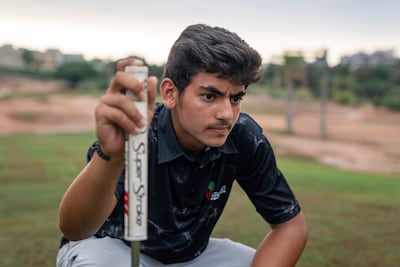
The Golf Club of Lebanon lives up to its name by default after the three other golf clubs in the country closed permanently during the 1975-1990 civil war.
The club was opened in 1923 in Khalde before developments to the international airport there prompted a move to its current site in the southern Beirut suburbs, an area known for its Palestinian refugee camps and Hezbollah-controlled neighbourhoods.
“I think the people who moved the club here in 1963 did not forecast for any of the changes of the following decades,” says Karim Salaam, the club president. “But nonetheless, it is what it is. Most of our employees are from the surrounding areas, so we're no strangers.”
Persistent handicaps
Regional conflict has threatened and in many ways defined the club's existence throughout its history.
When Israel invaded Lebanon in 1982, Israeli tanks tracked across the golf course, completely destroying it. It was Mr Salaam’s father who was tasked with rebuilding the club almost from scratch. In 2006, the last time Hezbollah and Israel were at war, an unopened crate of leaflets from the Israeli forces landed in the club grounds as the nearby suburbs were being bombed.
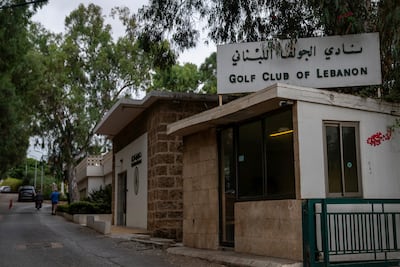
“The common denominator always has been the Israelis. They just have something personal with the club, maybe because it represents the Lebanon that they don't want to showcase,” Mr Salaam says.
In recent years, stories have circulated in Israeli media that the club has been used by Hezbollah for training, even as a potential missile-launching site, an accusation Mr Salaam strongly denies. He also denies reports in Israeli newspapers that a long-running disagreement with the local municipality about real estate fees was due to Hezbollah’s desire to take over the land.
“Sometimes [Israel] uses their weapons, and other times they use the media. So we're used to that. Our best way to answer is continue playing, tee off and just make sure we live the Lebanese way. That's our type of resistance,” he says.
Most recently, Israel's assassination of Hezbollah commander Fouad Shukr in the nearby neighbourhood of Dahiyeh has caused attendance to drop off, affecting club revenues.
Even though another conflict looms after months attacks between Israel and Hezbollah, Mr Salaam remains optimistic about the club’s future.
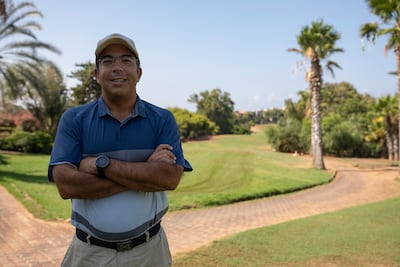
“We had to scale down on a lot of activities, we cancelled lots of events. But this is not something unusual, the club has been here since 1963. From then until today, we've had much, much more challenging times.
The club has made it through five years of economic crisis that have affected many leisure services in Lebanon, although the effect on the course is clear from the tyre tracks and sandy fairways.
“A month ago, I got a call in the morning that two out of our three generators just stopped working. How do we operate? How do we set it up whereby we're able to irrigate at night? Because our primary challenge is to continuously irrigate, especially in summer,” Mr Salaam says.
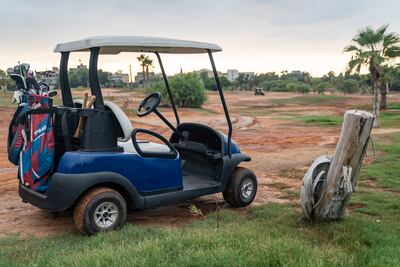
The lack of new equipment and the high salinity levels in the water make the upkeep of the course's grass a struggle. And with membership dropping from approximately 1,200 to 650 since 2010, covering costs while keeping rates affordable is a delicate balancing act.
“So, maybe other golf club presidents have the luxury of planning for the year ahead, which tournaments to host, what development plans to do; we take it short-term, sometimes daily. It's a real challenge, it keeps things interesting,” says Mr Salaam.
Back on the course, Mohammed and his friends play on under the watchful eye of their coach, Rachid Akl.
“We like to push them,” Mr Akl says with a smile.
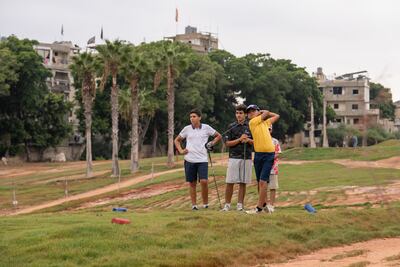
The two youngest in the group, Ahmad, 10, and Jalal, 12, were there as part of the club's school outreach to get young people into golf. They and the 30 others enrolled in the programme are part of what gives Mr Salaam hope for the future.
“I think a future without the club is a very dark future,” he says.
“We have so many internal and external challenges, yes, but I'm sure we'll overcome them.”


